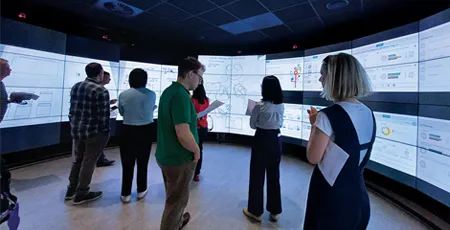What impact is AI having on health and wellbeing in the workplace?
A major new report has been getting some answers.
The National Forum for Health and Wellbeing at Work, which is based at AMBS, has put together a major report looking at the impact of AI on health and wellbeing.
The report was put together following a survey of business leaders, most of whom were based in the UK and worked for large corporations. The sample was split across many sectors, but predominantly comprised knowledge-based employees who were relatively established in their careers.
The survey split into analysis of AI use, as well as the impact of AI on:
- Job insecurity
- Work demands
- Autonomy
- Health
- Performance at work.
Respondents, half of whom were managers, were also asked two open questions, namely how AI could both positively and negatively impact health and wellbeing.
The report makes four key recommendations for organisations:
- Ethical AI use: organisations need to develop an AI policy, establish oversight and reporting mechanisms, and provide comprehensive training.
- Transparent culture: organisations need to ensure open and regular communication, clarify job impact, provide clear and relevant AI guidance for employees, and establish feedback channels and regular meetings.
- Employee engagement: organisations need to engage employees in AI integration, recognise and reward engagement, and empower employees to identify AI opportunities.
- Integration with health and wellbeing: organisations need to identify how AI tools can enhance employee wellbeing, align AI with wellbeing programmes, and educate employees on technology use.
The impact of AI on wellbeing
Professor Sir Cary Cooper, Co-chair of the National Forum for Health and Wellbeing at Work and 50th Anniversary Professor of Organisational Psychology & Health at AMBS, said: "we are only just beginning to truly understand the impact that AI will have on our working lives."
So far, almost all of the debate has been around the huge technological changes that AI could bring to the workplace, while there has been comparatively little discussion about its potential impact on our health and wellbeing.
Key questions
"Among the key questions we wanted to answer were how AI was affecting employees at work, what effect it was having on business outcomes and personal performance, and to what extent it was already being integrated into the workplace.
"How is AI affecting our levels of engagement? Is it making us more productive? Is it enhancing job quality?
"We also wanted to explore the potential downsides of AI. For instance, what impact is it having on our levels of independence and autonomy at work? How is it affecting our stress levels? And, put simply, is it making us happier or not at work?
"We feel this is an extremely timely report, which offers insights for businesses, organisations and policymakers alike."
AI adoption in the workplace
Karl Simons, Co-founder and Chief Futurist at FYLD AI, was tasked by the Forum with leading the review. He added:
"Over many decades I have watched workers struggle to adopt digital solutions pushed onto them due to the lack of product market fit between the human, their job and how a digital solution could aid them whilst at work.
"However, in recent years this has changed completely through the introduction of AI into the digital solutions offered.
"Having witnessed first-hand the power of AI in use by hundreds of organisations and tens of thousands of workers, the barriers to AI adoption continue to be dissolved."
There are however still challenges that continue to arise at both a practical and perceived level. These include issues such as:
- Employee trust and workers being wary of AI monitoring their data
- Concerns over data privacy and confidentiality breaches
- Ethical considerations with the need for AI systems to be transparent and avoid any biases or discrimination in the analysis and recommendations provided to employees.
"Organisations and particularly HR professionals must now look at how their business strategies are going to equip employees with a proper understanding of AI solutions."
The National Forum for Health and Wellbeing at Work produces a number of position papers, runs high profile networking events, and contributes to government policy papers and consultation exercises.
Data and AI for Leaders
Build confidence in your understanding of data and artificial intelligence (AI).
Tags:







